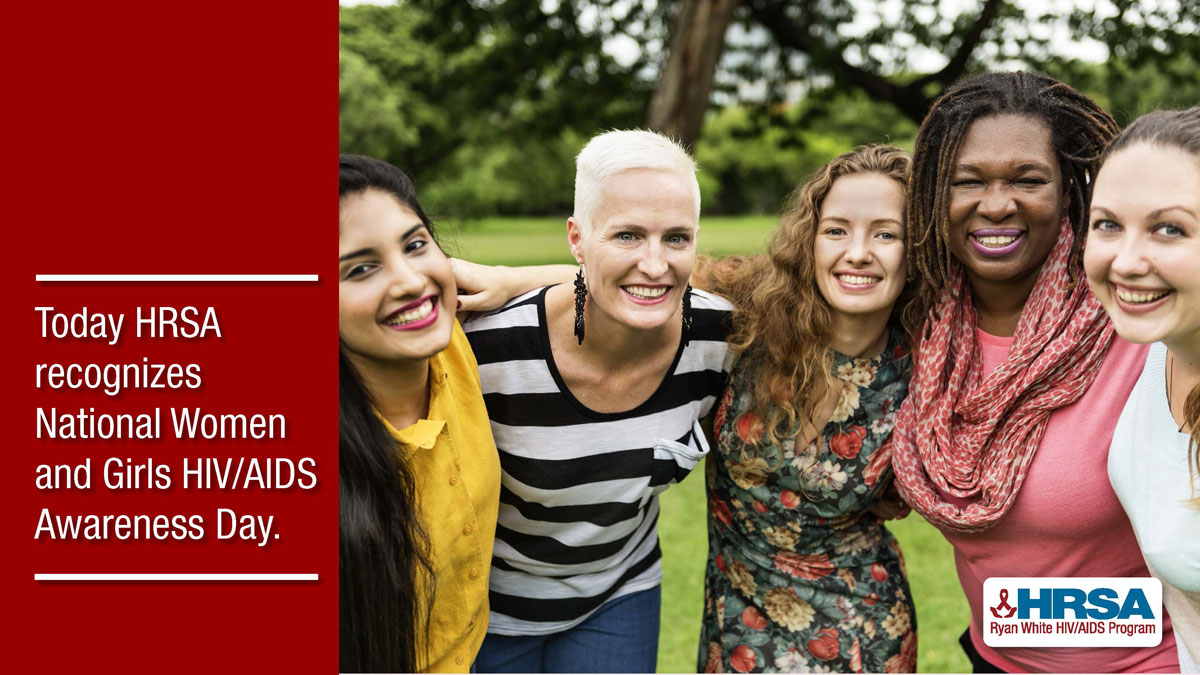HRSA Observes National Women and Girls HIV/AIDS Awareness Day
Topics

On March 10, the Health Resources and Services Administration (HRSA) will observe National Women and Girls HIV/AIDS Awareness Day (NWGHAAD). This awareness day is a critical opportunity to shed light on the impact of HIV on women and girls and to encourage discussions about HIV testing, sexual health, and the availability of HIV prevention or care and treatment services.
HIV disproportionately impacts Black women and transgender women in the United States, and they often face stigmas related to HIV status, gender, gender identity, and ethnicity. While the rate of HIV diagnoses in women has decreased in recent years, thousands of women are still diagnosed with HIV each year. In 2018, of the nearly 38,000 new HIV diagnoses in the U.S., more than 19% were among women. Moreover, 1 in 9 women with HIV are unaware of their diagnosis, so they cannot take advantage of HIV care and treatment, and may unknowingly pass HIV to others.
We are committed to helping women diagnosed with HIV get the care, treatment, and support services they need through the Ryan White HIV/AIDS Program (RWHAP). The RWHAP funds grants to cities, counties, states, and local community-based organizations to provide primary medical care, support services, and medications for low-income people with HIV. The RWHAP includes Part D grants, which are specifically for organizations and local and state agencies that provide ambulatory family-centered primary care and support services for women, infants, children, and youth with or affected by HIV.
In 2019, more than 148,000 women received services through the RWHAP. Almost half of these women are aged 50 and older, whereas only 4.1% are aged 13-24 years. Of the women who received services through the RWHAP, nearly 88% were virally suppressed—this means they have an undetectable viral load and effectively no risk of sexually transmitting the virus to an HIV-negative partner.
While progress has been made, there is still more work to be done. In the RWHAP, the majority of our female clients are from racial/ethnic minority populations, with about 61% percent identifying as Black/African American. To reach the goals of ending the HIV epidemic, we must address the barriers that prevent Black women from getting tested and accessing services and culturally-competent care, including stigma, medical mistrust, poverty, and fear of discrimination.
Many RWHAP recipients are working to address these barriers, including our Part F Special Projects of National Significance (SPNS) recipients, who are continuing to develop effective interventions that improve care and treatment coordination for Black women with HIV. HRSA has also convened a Technical Expert Panel (TEP) solely focused on how to better provide HIV prevention and treatment services for Black women.
On March 25 at 1:00 PM ET, we will discuss the SPNS initiatives, TEP, and more during the Women’s Health Leadership webinar, hosted by HRSA’s Office of Women’s Health. Register for the webinar hereExit Disclaimer.
Learn More
- Visit the Ryan White HIV/AIDS Program website: hab.hrsa.gov
- Find a RWHAP provider through this interactive map if you or someone you know needs HIV care: https://findhivcare.hrsa.gov/
- Sign up for the HIV/AIDS Bureau listserv
- Follow HRSA on FacebookExit Disclaimer, TwitterExit Disclaimer, and InstagramExit Disclaimer